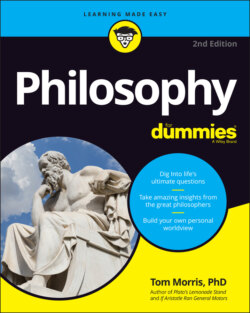Читать книгу Philosophy For Dummies - Tom Morris - Страница 53
GOOD MIND, BAD MEMORY
ОглавлениеEven very smart people often have terrible memories. I once walked across campus at the University of Notre Dame with a visiting philosopher from Oxford, a notoriously eccentric individual who had the strangest walk I had ever seen. He bobbed up and down as he strode full stretch, and yet when he came to a crossing of sidewalks, he switched instantly to a tiny stepping run, knees high and arms tight to his sides. In the midst of our animated philosophical conversation, I suddenly realized that I was face to face with something out of Monty Python’s Ministry of Silly Walks. I was utterly astonished at the sight, as I nearly breathlessly tried to keep up with this gymnastic, fast-paced dance of jog and bob, while thinking logically about arguments for the existence of God.
After ten minutes of this odd and aerobic theorizing, the eminent professor tried mightily to remember the name of one of his best friends and closest colleagues at Oxford, a don known as even more eccentric, with whom he had worked for many years. He wanted to recommend the man’s book to me, but for the life of him could not recall his friend’s name. Finally he sputtered, “You know, you know, the chap who walks so funny!” True story. As our often-quoted friend Montaigne realized, “The memory represents to us not what we choose but what it pleases.”
E.B. White articulated the phenomenon of very smart people with bad memories and other eccentricities well when he said, “Genius is more often found in a cracked pot than in a whole one.” If you doubt my veracity here, go to any major college or university and venture into the parking lot where the math faculty members park their cars. Arrive at about five o’clock in the afternoon, at the end of the day, and watch them look for their automobiles. It’s quite a sight.
Some people think that physical evidence is an independent third source for beliefs about the past. But whether it consists of fossilized footprints in stone or a videotape of an event, it is always presented to us now by our own sense experience, and moments later by memory, or else by sense experience, augmented with testimony and memory, first, that it is what it is (a fossil or footprint); second, that it is authentic and not faked; and third, concerning what it means. So because of its dependence on the reliability of these other sources, you don’t have to treat physical evidence as a third source category.
All your beliefs about the past depend on testimony or memory, or both, as well as on the original sense experience that led to your current access to that firsthand evidence, or secondhand report. The skeptic wants to ask a simple and yet penetrating general question. “How do we know that any of the sources of our beliefs are ever reliable?” But you can take it a step at a time. It’s useful to begin with beliefs about the past. The skeptic asks, “How do we know that memory or testimony is ever reliable?”
